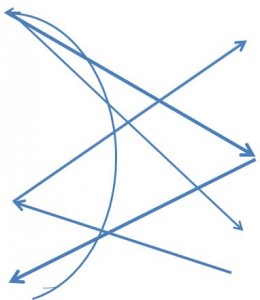A number of years of writing and teaching has forced me to be a student of the unexpected ricochet. That’s pretty much the whole game if you are playing racquetball, and it has a lot of relevance to communication.
 The actual court for the game is simply a 20 by 40-foot white box with walls that function as a playing surfaces for several players hitting a hard rubber ball. It’s typically smashed so hard against the playing wall that it comes back at speeds and angles are hard to predict. Those missed shots off the walls, ceiling or floor are how you score points against your opponent. Those who have escaped the sting of that small missile can be thankful. It hurts. A bruised French player must have coined the word “ricochet.” But it also evokes the unanticipated associations, meanings, slights, and bogus significations possible every time we open our mouths. More than most kinds of human endeavor, persuasion is fraught with effects that are unforeseen. No wonder it is so difficult.
The actual court for the game is simply a 20 by 40-foot white box with walls that function as a playing surfaces for several players hitting a hard rubber ball. It’s typically smashed so hard against the playing wall that it comes back at speeds and angles are hard to predict. Those missed shots off the walls, ceiling or floor are how you score points against your opponent. Those who have escaped the sting of that small missile can be thankful. It hurts. A bruised French player must have coined the word “ricochet.” But it also evokes the unanticipated associations, meanings, slights, and bogus significations possible every time we open our mouths. More than most kinds of human endeavor, persuasion is fraught with effects that are unforeseen. No wonder it is so difficult.
From a number of meta-studies we know that the odds of getting someone to alter their attitudes even after a flurry of good reasons have been presented is—on the best days—no better than maybe one in ten. After explaining this theory of “minimal effects” in a class, a student glumly asked, “What’s the point? Why bother? The challenge hardly seems worth the effort.”
The short answer is that we have no choice. We are hard-wired to connect. And, by the way, who says that convincing another person to give up an attitude or a cherished behavior should be easy? We’ve worked hard to put our lives together in some sort of coherent way; we are not going to rearrange them on a whim.
It’s best to consider what can go wrong. In persuasion theory, unexpected effects are called “boomerangs.” The idea is important to remember because even well-planned campaigns to change others’ behaviors can easily veer off course. I teach this logic, and encourage my students to wear their newly acquired skepticism as a badge of honor. Having a healthy level of doubt about predicted effects is a life skill. Recall Elon Musk brandishing his chain saw in the Oval Office, or hoisting his arm in some sort of Fascist salute, or demonstrating the toughness of his truck’s windows as one breaks. All were surely not what the unpopular Musk intended.
Consider some additional cases, mostly true:
- You show up to give an invited presentation to a group and (a) there is no screen for the PowerPoints you counted on, (b) there is nowhere to plug in your video projector, (c) there is no podium for your notes and (d) and a crew of ten men and machines are busy re-paving the parking lot next door. Under these circumstances, how effective do you think will can be?
- Your advertising agency has prepared a gay-friendly ad campaign that tested well and is now running in three national media outlets. Everyone on the creative team basks in their certain rewards of their progressive messages. But a respected leader in the LGBT community condemns the ads for “promoting old stereotypes.” Condemnation of the ads is getting more attention than the ads themselves.
- At a business lunch with a potential client you innocently praise the good service you once got from a large national retailer, only to be chided for supporting a chain whose owners are “political reactionaries.”
- You meet a new set of Michigan in-laws for the first time, not realizing that for this family of General Motors employees, your new Ford visible to all in their front driveway might just as well be a load of manure.
- You are Bridget Jones at a literary party in the midst of introducing the work of a hack you brazenly oversell as the author of “the greatest book of our time.” This happens just as you catch looks of dismay from the faces of Jeffrey Archer and Salman Rushdie, just a few feet away.
When it comes to communication, it is reasonable to worry about things going wrong. You will probably be pleasantly surprised, but it pays to be a little bit of a pessimist.




